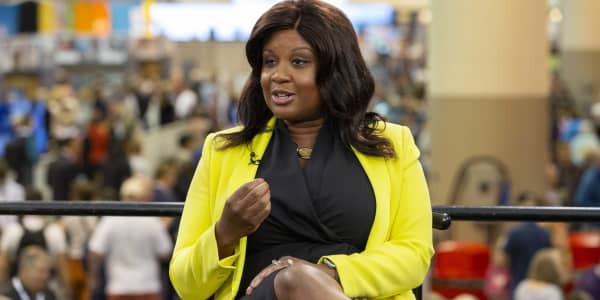No CEO would ever relish being called — or called out — by an incoming president with strong ideas and blunt talk about how a business should be run.
But the current generation of corporate leaders is, in many respects, uniquely out of step with President-elect Donald Trump's approach to production, trade, immigration and capital investment.
Today's chief executives of large companies have certain common attributes and priorities shaped by the dominant themes of their economic era — and they won the top job because they mastered them:
— They are, as a rule, globalists, making their companies supranational institutions, creating global supply chains and pushing to maximize open trade relationships.
—Their careers have also overlapped entirely with an age of constant productivity enhancement, with a key element of success defined as minimizing labor expenses. In the current economic expansion, labor's share of the economy has remained depressed relative to the following long historical trend.
Here, companies have been beneficiaries of a growing pool of immigrant workers, even if most CEOs don't actively advocate for porous borders.
— On the financial side, these CEOs have a bias (sharpened by their own incentive compensation terms) toward sending excess cash to shareholders in the form of share buybacks and dividends rather than heavy investment in the business.
— And, while Trump has not pushed social issues much during his transition, his rhetoric and appointees have signaled less concern about environmental protection and diversity — principles that today's multinational companies have placed near the core of their corporate culture.
Trump's interactions with United Technologies CEO Greg Hayes in persuading him to keep a Carrier furnace plant in Indiana rather than shifting production to a new, less costly facility in Mexico were instructive. Like many leaders of industrial conglomerates, United Technologies has been moving lower-value production elsewhere in a so-far successful bid to maintain strong profit margins.
The idea of preserving jobs here, even under an implicit threat of losing government contracts for other divisions, runs against the prevailing orientation of a CEO such as Hayes, who was the company's chief financial officer before gaining the top job two years ago.
It was a small concession relative to United Technologies' size, and so the market didn't punish the stock after the deal was struck. But you can bet CEOs everywhere are on alert for a potential cajoling five-minute phone call from the incoming dealmaker-in-chief, who might want to make an example of their company for political or policy gain, with little notice.
Executive recruiters who advise corporate boards on leadership issues concede that the world view that got CEOs their job could be at odds with a president-elect who seems to want to foster higher-cost/lower-productivity job growth in the U.S., use tariffs as a tactical trade weapon and encourage domestic capital investment even at a time of low unemployment and slack capacity utilization.
Some corporate consultants liken the challenge to the one posed in recent years by activist investors, only based on a different set of priorities.
John Wood, vice chairman of executive-search firm Heidrick & Struggles and member of its chief executive officer and board of directors' practice, said: "Previously with activists, and now with a president willing to shoot out a tweet, CEOs have to be more facile, adaptable and agile than they used to be."
"A lot of this started with activists — which blindsided [some] companies. Then it got to a point where they asked, 'If I did a phone call, what do I do?', then 'How do I prevent the phone call in the first place?'"
Nels Olson, vice chairman and co-leader of Korn Ferry's board and CEO services practice, points out that as with activist campaigns, "CEOs need to be a bit more agile in terms of some of the situations that have come up. If you were thinking about moving jobs, if it's a significant number of jobs — you'd better have a game plan for how you're going to address the Trump administration, or Trump himself."
On the other hand, "The good news is, you are dealing with a businessman interested in cutting a deal. That's actually a great place to be."
The question might become, when challenged on a business decision or principle: "Where are you going to stand your ground and where is too far?" Olsen added.
A great place to be, assuming a satisfactory deal can be cut, and perhaps that promised corporate tax cuts could offset, to whatever degree, the potential costs of keeping or adding jobs and facilities here in the states.
Charles Kantor, a portfolio manager who oversees $4 billion in assets at Neuberger Berman, has been in frequent contact with CEOs since the election. He says that if one assumes the market's apparent message is true — that "less taxes and less regulation" are benefits that outweigh "uncertainty around" Trump himself — he wonders: "Do CEOs need to be reminded again what investing for growth really looks like?"
If tax rates are cut, overseas cash is brought home at reduced tax rates, infrastructure spending ramps up and the White House is creating incentives to undertake capital projects at a time of tight labor markets, can CEOs exit the mode of nursing fat margins, and buying back lots of stock?
Of course, many companies are able to do some of these things at once, though investors will have to determine which ones are in the right business to start paying up for workers and capital today.
It's far from certain that this set of issues will kick in quite so neatly in the coming year or so. But if an investment handicapper were to boil them down to discern the economic and market implications, the one-word answer might well be "inflation." Wouldn't that be fitting, to have an inflation scare or two as bond yields rise, consumer inflation expectations in the University of Michigan sentiment survey fall to a six-year low and Wall Street assumes the Federal Reserve will stay "slower for longer?"





